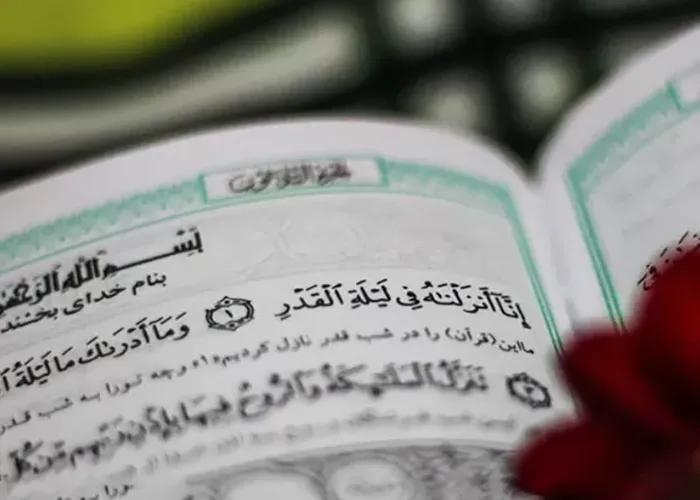Ayah Of The Week – Volume02 Issue12
The Night of Decree: A Night Worth More Than a Thousand Months
Introduction
Laylat al-Qadr, the Night of Decree, holds a special place in the hearts of Muslims worldwide. It is the night when the Quran was revealed, and its significance is so great that Allah describes it as “better than a thousand months.” While its exact date remains uncertain, it is widely believed to occur on one of the odd nights in the last ten days of Ramadan—most notably the 19th, 21st, or 23rd, with some traditions also considering the 27th. This night is a time for deep reflection, supplication, and spiritual transformation. For Muslims today, especially those living in the West, Laylat al-Qadr is an opportunity to renew their connection with their faith and seek divine guidance in an increasingly complex world.
Allah describes the immense value of this night in the Quran:
لَيْلَةُ الْقَدْرِ خَيْرٌ مِنْ أَلْفِ شَهْرٍ
“The Night of Decree is better than a thousand months.” (Surah Al-Qadr, 97:3)
This verse emphasises that the blessings and rewards of worship on this night surpass those of an entire lifetime. Understanding and embracing this divine opportunity can have profound implications for personal and communal growth.
The Relevance of Laylat al-Qadr Today
In today’s fast-paced and often materialistic world, moments of deep spiritual reflection are rare. Laylat al-Qadr offers an unparalleled opportunity for believers to pause, re-evaluate their lives, and seek divine mercy. With challenges such as Islamophobia, social injustices, and the pressures of modern life, Muslims in the West can use this night to find strength, guidance, and a renewed sense of purpose through prayer, Quranic recitation, and supplication.
Educational Lessons of this Ayah for Teenagers and Young Adults
- Recognising the Value of Time
Not all moments in life are equal in value. Just as Laylat al-Qadr is better than a thousand months, our choices at key moments can shape our destiny. Understanding the power of a single night should inspire young people to be mindful of how they spend their time. Just as a single seed can grow into a mighty tree, a single act of sincere devotion in a crucial moment can blossom into a life of spiritual fulfilment. Therefore, let the awareness of Laylat al-Qadr guide you to seek those moments of profound connection with the Divine, for they are the gateways to lasting spiritual growth.
Challenge: Identify one time-wasting habit and replace it with an act of worship or self-improvement during the last ten nights of Ramadan.
- Strengthening the Bond with the Quran
Laylat al-Qadr marks the revelation of the Quran. Young Muslims should take this opportunity to engage with the Quran beyond mere recitation—by reflecting on its meanings and applying its teachings in daily life.
Challenge: Choose one verse that resonates with you, study its meaning, and implement its guidance in your daily routine.
- Building a Habit of Seeking Forgiveness
The Prophet Muhammad (PBUH) encouraged seeking forgiveness, especially on Laylat al-Qadr. This night is a reminder that no matter one’s past, Allah’s mercy is always available.
Challenge: Set a personal goal to recite this verse 100 times on each of the last ten nights of Ramadan:
وَاسْتَغْفِرْ لِذَنْبِکَ وَلِلْمُؤْمِنِینَ وَالْمُؤْمِنَاتِ وَاللَّهُ یَعْلَمُ مُتَقَلَّبَکُمْ وَمَثْوَاکُمْ
And ask forgiveness for your sin, and for the believing men and believing women. And Allah knows your movement and your resting place.
Educational Lessons of this Ayah for Parents
- Teaching Children the Significance of Laylat al-Qadr
It is crucial for parents to educate their children about the importance of this night and make it a memorable experience by engaging in prayer together.
Challenge: Read the story of Laylat al-Qadr to your children and encourage them to make their own supplications.
- Leading by Example in Worship
Children learn from what they see. If parents prioritise Laylat al-Qadr by dedicating themselves to worship, their children will follow.
Challenge: Let your children see you engaging in prayer and Quran recitation, and invite them to join you in small acts of worship.
- Creating a Spirit of Gratitude and Reflection
Laylat al-Qadr is a time to reflect on one’s blessings and the power of divine decree. Encouraging gratitude in children fosters a positive and spiritually aware mindset.
Challenge: At iftar, have each family member share something they are grateful for before breaking their fast.
Educational Lessons of this Ayah for Imams and Religious Leaders
- Explaining the Balance Between Divine Decree and Human Free Will
One common question among Muslims is how Laylat al-Qadr, a night when destinies are decreed, aligns with human free will. Religious leaders should provide insights into how divine knowledge and human choices coexist harmoniously.
Challenge: Dedicate a sermon or a discussion to clarifying the concept of divine decree and its implications for personal responsibility.
- Encouraging Community Engagement During the Last Ten Nights
Religious leaders should inspire their congregations to make the most of Laylat al-Qadr by increasing their acts of worship, charity, and seeking forgiveness.
Challenge: Organise a night of collective prayer and Quranic reflection in the mosque, ensuring an inclusive and welcoming atmosphere for all community members.
- Addressing the Spiritual Needs of Young Muslims
Imams should use this occasion to engage with younger audiences, addressing their concerns and offering guidance on how to maintain faith in a secular environment.
Challenge: Hold an interactive Q&A session with young Muslims, discussing their struggles and how the teachings of Laylat al-Qadr can help them navigate modern challenges.
editor's pick
news via inbox
Subscribe to the newsletter.




